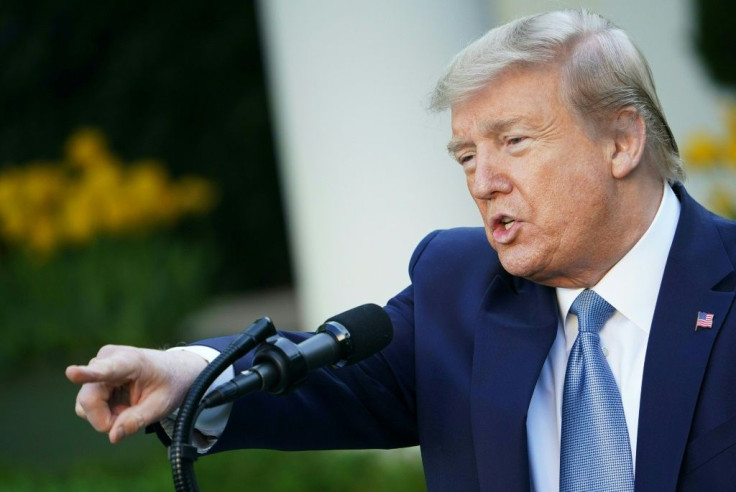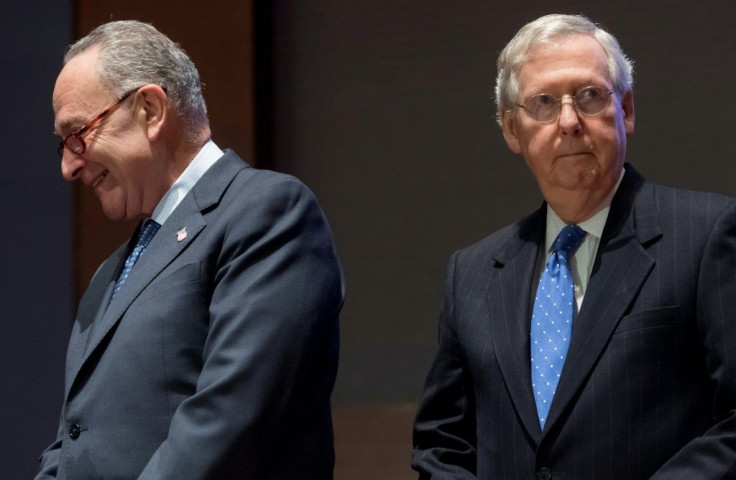Trump Threatens To Adjourn Congress To Fill Government Vacancies

US President Donald Trump threatened on Wednesday to take the unprecedented step of adjourning Congress to allow him to appoint top officials whose nominations he claimed were being blocked by Democrats in the Senate.
"I will exercise my constitutional authority to adjourn both chambers of Congress," Trump told reporters at a press conference in the Rose Garden of the White House.
"I'd rather not use that power," Trump said of a move that would likely trigger a legal fight between the White House and Congress. "We'll probably be challenged in court and we'll see who wins."
Trump accused Democrats in the Senate of stalling the nominations of several top administration officials whose appointments require hearings and Senate confirmation.
He said some of the vacant positions needing to be filled were vital to the response to the coronavirus epidemic which has left more than 27,000 people dead in the United States.
Past presidents have made what are known as "recess appointments" when Congress is not in session, and Trump said he may adjourn the Democratic-majority House of Representatives and the Republican-led Senate to allow him to fill vacancies.
Although both the House and Senate have not been meeting amid the coronavirus pandemic they have not formally adjourned, and have been holding what are called pro forma sessions.
They are scheduled to return in formal session on May 4.
"The Senate should either fulfill its duty and vote on my nominees or it should formally adjourn so I can make recess appointments," Trump said.
"If the House will not agree to that adjournment I will exercise my constitutional authority to adjourn both chambers of Congress," he said.
"Perhaps it's never been done before," Trump added. "But we're going to do it.
"We need these people here," he said. "We need people for this crisis, and we don't want to play any more political games."

Trump spoke on Wednesday with Kentucky Senator Mitch McConnell, the Republican Senate Majority leader, McConnell's office said.
"Leader McConnell had a conversation today with the president to discuss Senate Democrats' unprecedented obstruction of the president's well-qualified nominees and shared his continued frustration with the process," McConnell's office said.
But the Senate Majority Leader's office noted that confirmation of top administration appointees required the consent of Senator Chuck Schumer, the Democratic Senate Minority Leader.
"(McConnell) pledged to find ways to confirm nominees considered mission-critical to the COVID-19 pandemic, but under Senate rules that will take consent from Leader Schumer," McConnell's office said.
Article II, Section 3 of the Constitution gives the president the power to adjourn the House and Senate if they cannot agree between themselves on when to adjourn.
Among the vacancies Trump cited as needing to be filled was the director of national intelligence, two nominees to the Federal Reserve Board and a senior post in the Department of Agriculture.
Trump also complained that the Senate had yet to approve his nominee to head the body which has oversight over the Voice of America broadcasting network, which he accused of saying "disgusting things towards our country."
Trump's nominee for director of national intelligence, Congressman John Ratcliffe of Texas, has not yet appeared before the Senate Intelligence Committee, the first step before his nomination would be sent to the Senate floor.
Jonathan Turley, a constitutional scholar at George Washington University who testified against Trump's impeachment in Congress last year, warned the president against adjourning Congress.
"This power has never been used and should not be used now," Turley wrote on Twitter.
"I have long been a critic of such recess appointments," he said. "A pandemic should not be an invitation for pandemonium."
© Copyright AFP 2024. All rights reserved.





















